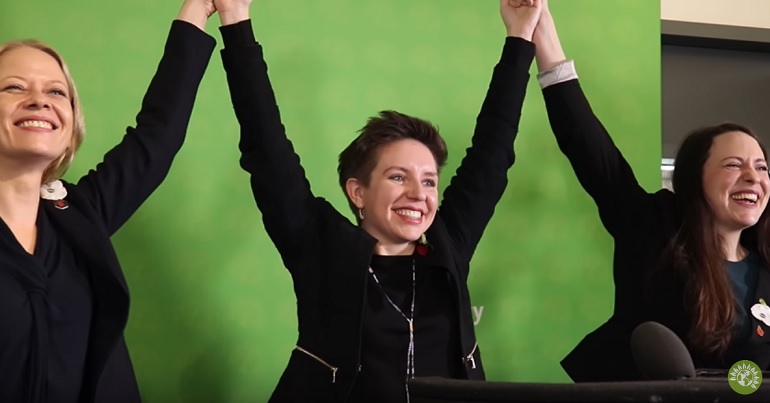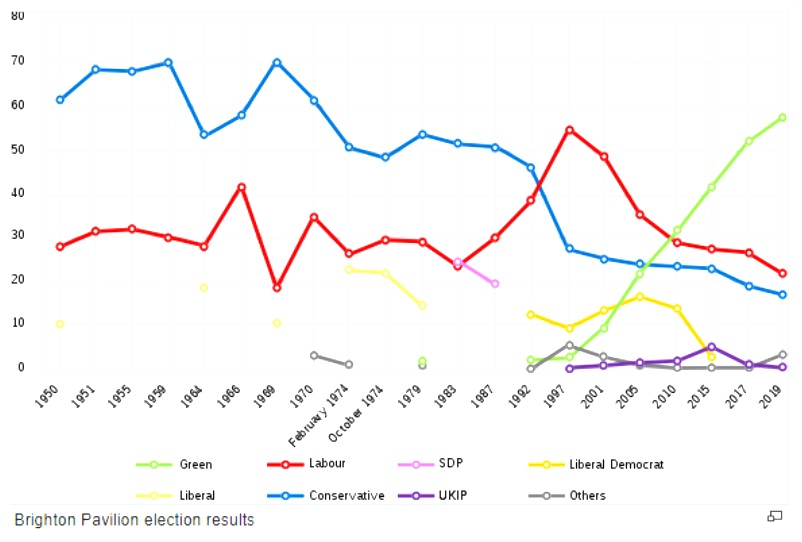The truth behind the Greens’ performance in the General Election

The election is over. Social media is filled with rancorous debate – unpicking Labour’s defeat. But what of the Greens? How was this election for us?
2017 was still a disaster
It’s hard to understate how difficult the result in 2017 was. We fell back in almost every single seat. Instead of being a whisker away from winning in Bristol West we suddenly were a mile away. No second places. Very few third places.
That has a legacy. Winning First Past the Post elections is slow and incremental work. It involves convincing the voters that you can actually win. Distant 3rd or 4th places do not do that.
It’s easily forgotten but winning in Brighton Pavilion took 13 years and 4 elections to breakthrough. Rome/Brighton wasn’t built in a day.

Sadly that political reality isn’t always conveyed by the party’s spokespeople. The frank truth is apart from Brighton Pavilion, there was not a single seat we could realistically claim we could win, based on 2017 results.
It would have taken record breaking swings for us to win in Bristol West or the Isle of Wight.
I understand the leadership has to talk up our chances of winning – to raise money, to give hope and to get media coverage. But it doesn’t help the shattered expectations of member’s raised hopes.
In 2015 we promised we were seriously contesting 12 seats. The fact is we weren’t. Our leadership knew that wasn’t the case. It surely contributed to the number of members who left us post Green surge.
Going forward we have to get the right balance of being optimistic and realistic about our target seats.
Being a third party
Stephen Bush has written a number of excellent columns detailing how the Liberal Democrats political fate is tied to the Labour Party. It seems evident that we have a similar problem.
When the Conservatives are in power it is simply harder for the Greens to take seats off Labour. When Labour is unpopular it’s difficult to get Conservatives or Liberal Democrats to lend us their vote. Fear of the opponent and tactical voting make it harder for us to win.
We won Brighton Pavilion on the tail end of an unpopular Labour government. Our Green vote grew most when it was a safe Labour seat. The context is very different now.
Our colleagues in the Australian Greens and Canadian Greens have very similar problems. They both operate under First Past the Post. They have more money and are arguably more established than we are. Both found it impossible to win a second seat whilst their Conservatives were in power.
Target to win
Target to win is our all hallowed manual for winning council elections. Frankly there were some choices this election that makes me wonder how much we’ve internalised it.
When choosing a target ward local parties are asked to consider:
The size of majority – marginal seats are often closely fought by other parties and therefore harder to win
Can we show we are one of two top candidates? – Often people vote for who is their preferred candidates between the two perceived potential winners
Quality of competition – This is the most important factor and relates to both the incumbent
councillor (are they well-liked and very active in the ward?) and other parties’ activity in the ward (if LibDems and Labour are both doing lots of leaflets and doorknocking, it will be much harder for us to win)
Under those criteria how on Earth were Vale of Glamorgan or Stroud considered target seats and therefore Unite to Remain seats? Both are heavily contested marginal seats – where inevitably the Green vote was crowded out.
For those activists who poured their hearts into these seats it’s not a direct attack. I know so much hard work was done. But strategically activists deserve better than poor decisions on targets.
Decisions on national targets need to be made on empirical data. On our electoral strategy. Not where candidates live.
Red and blue walls
Under First Past the Post, across the globe, only 5 seats have ever been won by Green Parties. Three in Canada, one in Australia and one in the UK.
What do these seats have in common?
Four out of five were won whilst Labour or the Liberals were in power, with only the first Canadian seat having been won when the Conservatives were in power.
Another is that they were nearly all initially held by a progressive party – but they all had a substantial Conservative vote. That meant that the winning margin was around 30%-40%, instead of 50% or 60%.
Our current challenge is that in our best performing seats (Bristol West, Isle of Wight, Dulwich and West Norwood, Bury St Edmunds) – the winning party is getting 60%+ of the vote. We seem to have given ourselves seats where the margin to win is much more challenging.
The fact is we can’t be afraid to ask challenging questions about where is most winnable. A seat like Bristol West may only become winnable after five years of an unpopular Labour government.
Finally all five Green won seats were won where the Greens had a history of growing electoral success in state or local elections. It took years of winning council seats to become competitive in Brighton or Bristol. Only in Bury St Edmunds do we have a similar councillor base.
Seats like Exeter and Isle of Wight have to demonstrate better success at the local level to be deemed truly competitive at a national level.
Unite to Win?
Was Unite to Remain an absolute failure? That seems to be a prevailing view. My own personal view is that (on purely electoral measures) it’s too early to tell.
As I said before, from the 2017 results, there wasn’t a winnable second seat in the country. We were too far behind in any target seat. Off the back of Unite to Remain we have three strong seconds and thirds (Dulwich and West Norwood, Bristol West and Bury St Edmunds), but in each of them we are still 35%+ behind the leading party.
We may be able to turn the seats into Green gains, but with First Past the Post it could be after the next election this happens.
The Tories implementing boundary reviews could complicate matters further. Whilst smaller seats in general might make the work of campaigning more manageable (especially in the Isle of Wight) it may also entrench Tory incumbents in places like Bury St Edmunds. We will have to see how brutal Boris’s imminent attempt at gerrymandering is.
Next steps
Internally I think we have to have an honest conversation that our next set of Green wins may be two elections away. From that we have to embrace how we keep members enthused about council elections and gains in elections held under a more proportional system (like the Welsh Assembly and the London Assembly).
There’s currently lots of debate about what policy should look like and whether a more centrist or radical approach may pay more dividends. When it comes to winning seats I’d simply argue it’s not as relevant as people think it is. If we can’t convince voters we’re in contention locally with vibrant local campaigns and clear marks of electoral progress – then policy falls on deaf ears.
We have the luxury that we know the next election will be four or five years away. When the Canadian Greens were trying to win their first seat they did an extensive data analysis before building up a winning campaign from scratch on Victoria Island. Their national party proactively identified a winnable seat – then worked with activists to build a campaign there.
It maybe that this is the approach we have to take going forward. It may be that a local party needs proactive support to become the election winning machine of tomorrow. Regional parties will need to think about how they offer support to these places so they’re hitting benchmarks of regular door knocking and leafleting across the constituency. We know what a winning campaign looks like – we can support volunteer led parties to help hit that mark.
PS. We hope you enjoyed this article. Bright Green has got big plans for the future to publish many more articles like this. You can help make that happen. Please donate to Bright Green now.




I did a bit of leafleting on the IOW, enthused by the on the Street support for the Green Party.
Not sure on your ‘we need a failing Labour government’ theory. A self destructing Labour party may also bleed new members and voters to the Greens?
Some random points:
Don’t refer to Johnson as “Boris” – you’re just enhancing his carefully cultivated cartoon character reputation by doing that.
Why fall into the trap of campaigning the way traditional parties have done in the past when we know it doesn’t really work for smaller parties? Maybe other approaches might be more fruitful, many of which, I think should consider the Tories’ election guru mantra – you can’t fatten the pig on market day.
I think we should look to grow the membership and make the experience of being a member a much more positive and practical one, one that is useful every day and that other folk will want to buy into, like having a “Greens only” space in every town centre, accessible only via a membership card.
Labour are dying because their traditional connections with people are withering. On the doorstep, people feel little connection with the big parties – I suspect that the road to a boost for the Greens runs through a scheme where we generate a sticky website – a sort of benign “facebook for politics” – and by demonstrating a constant physical and active presence where people will see us, and more crucially, want to join us.
You make some excellent points.
Traditional parties have moved into ghettos where the activists have little connection to the communities that they purport to represent.
There seems to be an attitude that ‘membership’ involves no more than the periodic stuffing of leaflets through letterboxes and occasional door-knocking rather than effecting real change for the people who are crying out for that change.
To grow connections to communities The Greens need to do something different. There’s really no point in apeing the other parties – repeating their mistakes will go nowhere.
Yes to your idea of ‘Green Spaces’ in communities, but why not overtly labelled local Green Party Litter Picks, Green Party Community Transport, Green Party Foodbanks (yes – we shouldn’t need them, but…) and Green Party Cycle Repair Hubs – as just a few random ideas.
These sorts of things wouldn’t be cheap to pump-prime, or easy to get going, and it’s a darned sight more hard work than just pushing leaflets through doors every few years – but do Greens really want to change anything, or just talk about it?
I wonder whether it was so ill thought through to focus on Stroud. I live near Stroud so know it has a large green and radical proportion of the electorate. The current Labour candidate who is popular, though not well known nationally, is likely to stand down soon probably for next election, though who knows. So with an increase in green vote in the coming local elections a strong possibility I would think a large increase in a green vote in the next GE is also a strong possibility. But given the climate emergency even national politics are looking a bit irrelevant in small countries. The EU,the US, India and China seem the really important blocks to act on Climate. Out of the EU we seem almost irrelevant, which may be just as well with Johnson and the Tory’s having virtual dictatorial power.
Surely the best response wether we’re big or small and we’re 5th biggest economy apparently is to decarbonise.The world’s economies are linked so our action spreads?
a very interesting read as always. I would welcome feedback on how my own efforts went down as well. P.S. I was thanked for my phone-banking efforts but just because I look similar to Benali and I am in fact another one.
I do not understand why the Green Party doesn’t focus much more politically and strategically for example in Hove. Hove is next door to the Green constituency of Pavilion Brighton.
Brighton has double figure Green Cllrs in Brighton and Hove. The current LP MP in Hove is seen as Blairite friend of Mandleson by the local LP of whom many might lend their vote to a Left Green like the Green Cllr’s convenor Phélim Mc Cafferty.
Because of ridiculous anxiety about Carolines position very few resources are targetted on Hove The constituency the otherside of Pavilion Kemptown is held by a left wing and v environment focused ace Labour Party MP.
A centrist Green candidate was chosen by the local Green Party tp contest Hove and a left wing GP candidate for Kemptown. No strategy whatsoever.
Some interesting insights. However Australia does not uses the FPTP system. It uses a ranked voting or preferential system which is entirely different to First Past the Post
Its not entirely different. it is different but with similair challenges.
the challenge been that you have to win in one concentrated area and have to attract people who are not all your natural supporters to win. In Proportional systems you can win by just going after your natural supporters but then that can cap your growth to in other ways.
Also the Greens did win a seat in a usa state parliament under first past the post but the candidate defected to the democrats, think it was maine or conneticut.
Instant-Runoff voting as it is called in Australia is different to first-past-the-post, but not entirely different as it still inherently favours a two-party system as it necessary to get to 50%+1 to win each seat as a separate contest, with smaller parties eliminated first.